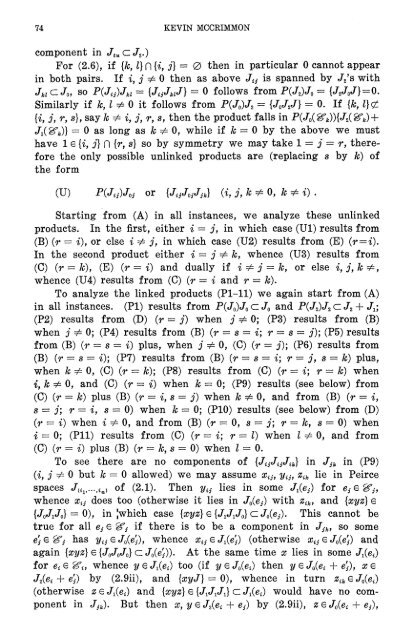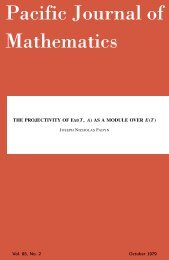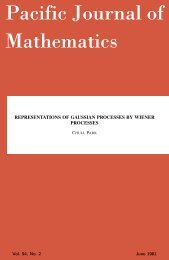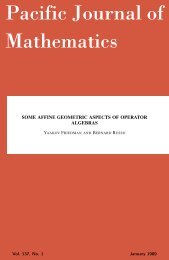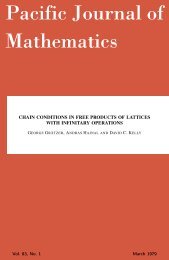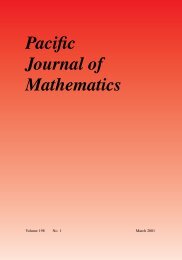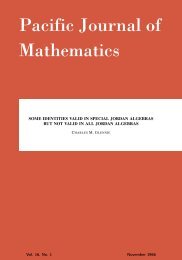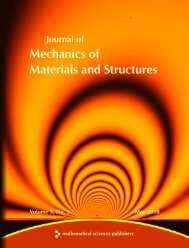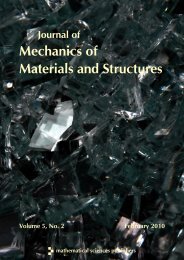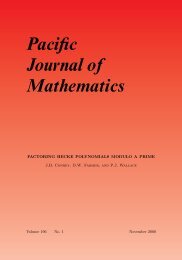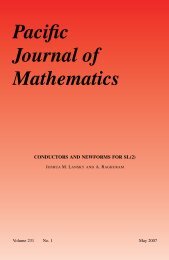Compatible Peirce decompositions of Jordan triple systems - MSP
Compatible Peirce decompositions of Jordan triple systems - MSP
Compatible Peirce decompositions of Jordan triple systems - MSP
Create successful ePaper yourself
Turn your PDF publications into a flip-book with our unique Google optimized e-Paper software.
74 KEVIN MCCRIMMON<br />
component in J tucJ 2.)<br />
For (2.6), if {&, 1)0 {i, j} = 0 then in particular 0 cannot appear<br />
in both pairs. If i, j Φ 0 then as above J i$ is spanned by J 2's with<br />
J klc.J 0, so P{J iβ)J kι = {JijJkiJ} = 0 follows from P(J 2)J 0 = {JWl^O.<br />
Similarly if k, I Φ 0 it follows from PWΛ = {JJJΓ} = 0. If {fe, Z}£<br />
ίi i> n s}, say kΦi f j, r, s, then the product falls in P(J 0(ί? k)){J i(&k) +<br />
j-^g 7 ^)} = 0 as long as k Φ 0, while if & = 0 by the above we must<br />
have 1 6 {i, j} Π {r, s) so by symmetry we may take 1 = j = r, therefore<br />
the only possible unlinked products are (replacing s by fc) <strong>of</strong><br />
the form<br />
(U) PGWo/ or {JijJojJn} (ί, j , k Φ θ , k Φ i ) .<br />
Starting from (A) in all instances, we analyze these unlinked<br />
products. In the first, either ί — j, in which case (Ul) results from<br />
(B) (r = i), or else i Φ j, in which case (U2) results from (E) (r=£).<br />
In the second product either i = j Φ k, whence (U3) results from<br />
(C) (r = k), (E) (r = i) and dually if i Φ j — k, or else<br />
whence (U4) results from (C) (r = ΐ and r = k).<br />
i,j,kΦ,<br />
To analyze the linked products (Pl-11) we again start from (A)<br />
in all instances. (PI) results from P(J0)JocJ0 and P(J2)J2ciJ2 + Jt; (P2) results from (D) (r = j) when i ^ 0; (P3) results from (B)<br />
when j Φ 0; (P4) results from (B) (r = s = i; r = s = i); (P5) results<br />
from (B) (r — s = ΐ) plus, when i ^ 0, (C) (r = j); (P6) results from<br />
(B) (r = β = £); (P7) results from (B) (r = s = i; r = i, s = fc) plus,<br />
when & ^ 0, (C) (r = fc); (P8) results from (C) (r = £; r = fc) when<br />
i,kΦθ, and (C) (r = ί) when & = 0; (P9) results (see below) from<br />
(C) (r = k) plus (B) (r = ί, s = j) when k Φ 0, and from (B) (r = i,<br />
s = i; r = i, 8 = 0) when λ; = 0; (P10) results (see below) from (D)<br />
(r = i) when i =£ 0, and from (B) (r = 0, 8 = j; r — k, s = 0) when<br />
i — 0; (Pll) results from (C) (r = i; r = Z) when i ^ 0, and from<br />
(C) (r = i) plus (B) (r = k, s = 0) when Z = 0.<br />
To see there are no components <strong>of</strong> {JijJijJik } in Jjk in (P9)<br />
(if j Φ 0 but fc = 0 allowed) we may assume xih ytj , zik lie in <strong>Peirce</strong><br />
spaces Juv ... tin ) <strong>of</strong> (2.1). Then ytj lies in some Jx (eά ) for ^ e ^ ,<br />
whence α^ does too (otherwise it lies in J0 (e/) with ziki and {xyz} e<br />
{JQJJO} = 0), in Jwhich case {CCT/^} e {J^Jo} c J (βi). 0 This cannot be<br />
true for all β 6 g y 7 ^ if there is to be a component in J , ίk so some<br />
βy6^ has VijβJoie'j), whence x jGJι(e'j) t (otherwise x eJ (ej) iS 0 and<br />
again {xyz} e {Jo«Vo} c J (e'/)). 0 At the same time x lies in some Jfa)<br />
for e


